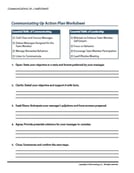
If you're a team leader, Communicating Up is essential to getting your ideas and suggestions heard by those in charge. It's also a great way to keep your manager informed about your team's progress and accomplishments. In this blog post, we'll discuss some tips for communicating effectively with your manager, so that you can get the most out of your relationship!
Sometimes communicating with your manager is not only essential for getting your ideas and suggestions heard, but it's also an important part of keeping them informed about your team's progress and accomplishments. This requires proactive engagement from both sides in order to ensure that lines of communication are open and clear.
As a free resource, look at our Communicating Up Action Plan Worksheet for more in-depth learning on gaining an understanding of different styles, preferences, and situations when crafting communications accordingly:

What Kind of Communication Exists Between You and the Manager?
Communicating Up to your manager can take many different forms, depending on the company culture or the relationship between you and your manager. Generally speaking, there are two main types of communication: informal and formal.
- Informal communication is a more casual approach and includes things like talking to your manager in an open, friendly manner; having conversations at lunch or after work; sending emails back and forth about projects; having an open discussion about ideas or issues, and inviting your manager out for coffee or lunch. This type of communication allows for more flexibility, with less structure and formality.
- Formal communication is structured and often more official in nature, as it typically involves documents such as performance reviews, policy statements, email protocols, budget plans, etc. It also usually involves meeting with your manager in a more structured setting where topics are discussed in detail and decisions are made. This type of communication allows you to better assert yourself when discussing challenges or advocating for new initiatives that you believe will be beneficial for the organization.
By understanding the different types of communication available to you when Communicating Up to your manager, you can better tailor your approach so that it resonates with them best.
It's important to be formal and direct when communicating with your manager, especially if you're requesting more resources or guidance on a project. Being informal and approachable can help create a positive rapport between you and your manager. This means being friendly and flexible, and responding quickly to their feedback or questions about projects.
Overall, there are many different types of communication that can exist between you and your manager, depending on the situation. The key is to find a balance between being formal & informal, direct, and approachable in order to best collaborate with your team and achieve your shared goals.
Grabbing Your Manager's Time and Attention
In order to communicate effectively with your manager and get their time and attention, it's important to be mindful of their busy schedule. This might mean scheduling regular meetings or appointments with them and communicating in a timely manner about any issues or deadlines that may arise.
You may need to be proactive in reaching out to your manager and requesting their input on specific projects or tasks. This can involve scheduling time for one-on-one meetings or sending regular status updates so that they are always up-to-date with the progress of your team.
Influencing Manager Decisions
Another key factor in communicating with your manager effectively is influencing their decisions and ensuring that your team's needs are taken into consideration. Ideally, providing them with data or other relevant information that supports your ideas or recommendations can work in your favor, as well as being open to feedback and suggestions from them.
Some strategies for influencing manager decisions can include engaging in regular dialogue with your manager, building strong relationships through effective communication, and presenting clear and compelling arguments that support your ideas. Being proactive, flexible, and strategic in the way you engage with them, can create a strong foundation for collaboration and success within your team.
Find A Balance: Assertive vs Collaborative
Being assertive means being clear and direct in your communication to ensure that your ideas and needs are heard and taken into consideration. However, it's also important to be collaborative and flexible when working with your manager, by listening to their feedback and suggestions, collaborating on projects, and supporting their decisions as a team member. In this way, you can maintain an assertive approach while still being respectful of the dynamic between you and your manager.
Whether you're communicating with upper management or one-on-one with your manager, the key is to find an assertive balance that works for both sides. By focusing on open and productive communication, consistent collaboration, data-driven decision-making, and clarity in goals and objectives, you can create a strong and productive relationship with your manager, which is essential for achieving success as a team.
What's The Takeaway?
Communicating your successes can help build positive relationships between upper management and lower-level teams, which in turn can lead to more successful projects. Explore a course preview of Communicating Up for foundational skills in creating productful meetings with managers, crafting clearly stated objectives, and answers to anticipated questions:
Taking the time to communicate effectively with your manager is essential for making sure that your team is running smoothly and achieving its desired results.




